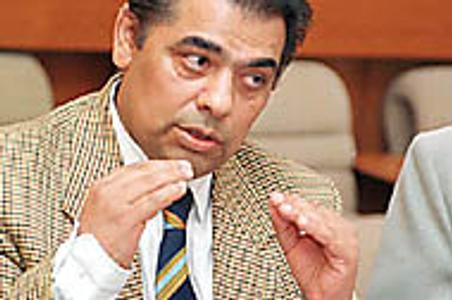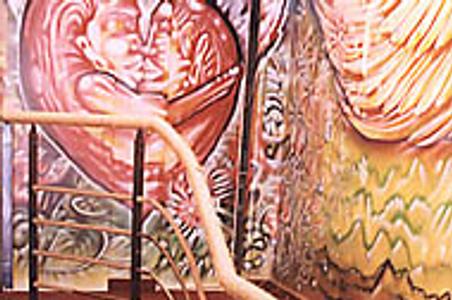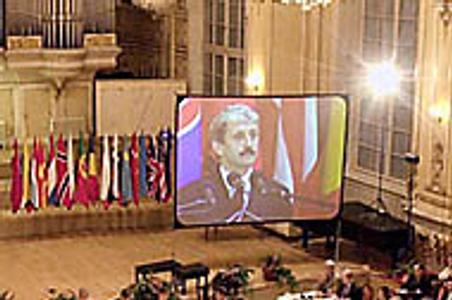Archive of articles - May 2001, page 2
If you desire to read an old article, use the search bar or select the publication date.
Business Briefs
Incentives package brings Slovakia up to regional parQuestion marks remain over Imuna tenderŽSR chief Egyed holds on to top job
Justice blows whistle on own court
The Chief Justice of the Banská Bystrica Regional Court has turned the judicial sector on its head by carrying out a survey documenting the prevalence of corruption at her own court.During 20 days in April, Justice Jana Dubovcová arranged that 281 people visiting her court be given a survey form to fill out, asking them if they had met with corruption at the court. Of the 30 people who completed and returned the forms, 30% claimed to have had direct experience of corruption, two thirds of whom said they had been asked for a bribe by a judge. The sums demanded ranged between 6,000 Slovak crowns and 150,000 crowns ($124 to $3,090), with the highest being paid in criminal law cases.
Community Corner
International Children's DayOrganised RunsSpanish Embassy film and theatre performancesFrench Institute lecture and exhibitionUnusual classical concert in PiešťanyBratislava Town GallerySpanish exhibition at Danubiana
FWA winner fears market squeeze
Twenty-four hours after winning one of three licences granted by the state to operate Fixed Wireless Access (FWA) services, telecoms firm GiTy Slovakia warned May 22 that the Slovak market will not be big enough to accommodate three operators.Having seen his firm beat Metis Slovakia and RDT for the licence, GiTy Slovakia CEO Ján Súkeník declared: "There's room for healthy competition between two operators, but not more. Three is more than the market can hold."Joined by Nextra Wireless and Callino, GiTy will offer the FWA service, aimed at providing a 'last mile' connection to companies and homes from urban fixed-line hubs - a service currently dominated by the Deutsche Telekom-owned fixed-line monopoly Slovenské Telekomunikácie (Slovak Telecom - ST).
Slovnaft aims for Transpetrol buy after return to profit
Slovak oil refiner Slovnaft confirmed its intention May 16 to raise its current 34% stake in crude oil pipeline operator Transpetrol to a majority one on the back of a post-tax profit of 1.84 billion crowns for the year 2000.The announcement also coincided with a statement from the government that it would sell its 49% stake in the firm as a whole package, confirming the fears of stock market dealers that they would not see any of the possibly lucrative shares floated on trading floors."We declared our interest in Transpetrol more than a year ago, when our financial results were much worse. Our improvement will help us generate more resources for this investment," said Slovnaft spokesman Ľubomír Žitňan.
Tax breaks: Keeping up with the Joneses
As of last week, Slovakia has a new tax incentives law that allows it to offer both foreign and domestic investors 10-year exemptions from paying taxes. The cabinet law was passed to little fanfare, for two reasons; first, because no government really likes such laws, and passes them only because all of its neighbours have one, and second, because in its drawn-out battle with the European Union to get approval for the law, the Slovak side had to write in a few clauses that significantly restrict eligibility for the incentives.
Letters to the editor
Mixed marriages indeed a bumpy rideNot all the elderly revere Mečiar!Should the media be leashed in?Well, of course women are paid less than men
IRB defends 1Q loss as due to restructuring
Management at state bank Investičná a rozvojová banka (Investment and Development Bank - IRB) May 11 defended a first quarter loss of 47 million crowns ($980,000) as a result of structural and organisational changes."Our organisational changes have been costly. We have laid off 240 employees, entailing redundancy costs and restructured loans. These have been the main causes behind the loss," said Iľja Iliť, director of the bank office at IRB.Announcing the results, IRB chiefs pointed out that the bank had repaid large debts. The finance house repaid a 3.8 billion crown ($79 million) deposit to a consortium of Slovak financial institutions for an earlier loan, using the proceeds from a government sale of restructuring bonds from its portfolio to make the payment. They also pointed out that IRB had improved on a 117 million crown loss in the same period of 2000.
Cabinet fires lame-duck Roma appointee
Although ostensibly fired for his lack of English skills (among other reasons), Cabinet Plenipotentiary for Solving Roma Issues Vincent Danihel had little difficulty reading the writing on the wall. Contacted by The Slovak Spectator on May 3, he refused to answer questions about his future, saying that he would grant a full interview "as soon as I'm recalled. Just wait a week or two."Six days later Danihel was indeed fired after a two year tenure in the post. Deputy Prime Minister for Minority Rights Pál Csáky, Danihel's direct boss, said that the plenipotentiary had been sacked because he lacked support among the Roma and because he had achieved poor results in his main task - solving some of the worst problems affecting the Roma, one of Slovakia's largest minority populations."I thought he'd be able to address the Roma elite and the larger community," Csáky said afterwards. "It's a pity, but this never happened."
Around Slovakia
Scythe attacker shotFirst child of 2001 to be sent to orphanageGophers transported to protected area
Editor Petr Šabata: Journalists must serve only one master
Czech journalist Petr Šabata has been editor-in-chief of the Slovak paper Pravda ('Truth') since March 1, 2001. At age 39, he has over 16 years experience as a reporter and later editor-in-chief of the influential Czech daily Mladá Fronta Dnes, experience that spans both communism and capitalism, the break-up of Czechoslovakia and the 1989 Velvet Revolution.He says there is room on the Slovak media market for one or two 'serious' newspapers, and that the best part of his new job is getting a chance to improve Pravda, to make it a newspaper "that's fun to read". The Slovak Spectator spoke to him May 16 about his first several months in Slovakia.The Slovak Spectator (TSS): You've been a journalist since 1985. How difficult was it for you after fall of the Communism in 1989 to make the transition to thinking and writing for a 'capitalist' market?
None the wiser: Deciphering phone bills
One of the toughest parts of living in a foreign country can be the isolation that it imposes. If you're hooked up to the Internet and to a competent telephone company, you can communicate with friends and family often enough not to get desperately lonely, but if you have to rely on regular post and a state-owned telecoms monopoly, the separation can be intolerable.When I first came to Slovakia in 1992 I was posted as a teacher at a school in a western Slovak town. Cold, wet, foggy and utterly cut off from the rest of the world was how Piešťany seemed on first acquaintance, an impression that was not improved by the passage of time. The worst of it, for me, was not having access to a telephone. Phones existed at the school, but they were strictly reserved for the use of Authorised Personnel, a group that I have never in my life belonged to, for anything. One night I couldn't take it any more, and broke into the reception office to dial home. I dialled and dialled, speaking to one friend in Vancouver and another in Montreal, to parents and acquaintances. I spoke for a good hour.The next day I expected the worst - after all, it wouldn't take the school's phone authorities too long to figure out who had been dialing Canada, and I could probably expect to be booked and have the bill deducted from my princely 3,200 crown ($140) monthly salary.
Review: Buddha Bar: Zen and the art of tea-drinking
Walking past bright murals in the entry hallway, I descend down carpeted stairs. At the bottom await a low-hanging arched brick roof, air dimly lit with a rainbow of colours, and a placid pitbull terrier who seems to be smiling at me.I sit down and read the two menus, one covering the gamut of bar drinks from wine and whiskey to beer and borovička, the other exclusively for teas. Zuzana, my waitress who has sparkles on her face and is wearing a T-shirt reading 'Rump Shaker', sits down across from me, lights the candle on my table and asks what I would like to drink. "Body & Soul", I respond. She smiles and nods knowingly, then floats across the room to prepare my order.Welcome to one of Bratislava's newest - and finest - night spots: Buddha Bar. Located on the fringes of the Old Town, the bar was opened in February by a group of close friends who had studied hotel management together. Aiming to create a relaxed "living room culture" which would also reflect their spirituality (Zuzana is a believer in reincarnation), they have created an establishment noteworthy for its friendly and sedate atmosphere.
Business Briefs
Government to sell Transpetrol stake as a wholeHarsco to create more than 100 jobs in KošiceIMF critical of poor banking sector governance
Community Corner
Agnieszka Holland's films in EnglishBratislava Women's club exhibitionBritish Wine and Cheese eveningGoethe Institute conference in Banská BystricaGoethe Institute exhibitionAustrian Culture Forum lectureFrench Institute concert and exhibitionsSocial Centre in PiešťanyAustrian Culture Centre exhibition in PrešovBratislava Town GallerySpanish exhibition at DanubianaBahá'í Community
Reshuffle axe hangs over Schmögnerová
Economic analysts and market dealers fear that a planned government reshuffle (see story front page) may see Finance Minister Brigita Schmögnerová recalled.Many multinational corporations and potential investors see her as a guarantor of economic reform, and her dismissal could have a serious effect on foreign investment, analysts say."Both Schmögnerová and [Deputy Prime Minister for the Economy Ivan] Mikloš are people that we follow quite closely and identify very strongly with for reforms," said Jeff Gable, an analyst with Deutsche Bank in London.
PM takes high hand as next minister quits
Following the recall of Deputy Prime Minister for Integration Pavol Hamžík in early May, another member of Slovakia's five-party cabinet gave up his job last week. Calling himself a "thorn in the eye" of some of his ruling coalition colleagues, Interior Minister Ladislav Pittner resigned May 14 in order, he said, to remove a barrier to stable government.Ironically, however, Pittner's departure hurt rather than helped cabinet stability, as a scuffle over who would replace the minister led to a suggestion by the Christian Democrats (KDH) that they might leave the coalition.According to political scientist Grigorij Mesežnikov, president of the Bratislava-based Institute for Public Affairs think tank, the current crisis - like so many in the government's 30-month history - does not seriously threaten the longevity of the Mikuláš Dzurinda administration.
United we apply, divided we join?
Peppered with pro-US rhetoric and a commitment to support other states' EU and NATO accession ambitions, Prime Minister Mikuláš Dzurinda's opening speech set the tone for a May 10-12 Bratislava conference which brought together eight prime ministers and two deputy prime ministers from different states across central and eastern Europe.The Slovak government-backed "Europe's New Democracies: Leadership and Responsibility" conference was attended by political leaders of the 'Vilnius Nine' group of applicants for admission to the North Atlantic Treaty Organisation (NATO) - Romania, Macedonia, Albania, Croatia, Slovakia, Slovenia, Lithuania, Estonia, Latvia and Bulgaria. Croat Prime Minister Ivica Račan was also in attendance. These countries had met one year ago in Vilnius, the Lithuanian capital, and had committed to supporting each other's European Union and NATO entry efforts.The aim of the recent Bratislava conference was to reaffirm this joint commitment and deliver a message to NATO leaders that invitations to enter the alliance are expected to be issued at the alliance's Prague summit next fall.
- The law changed. Our family papers were ready. Now my kids are Slovak citizens
- Maria Theresa on the banks of Bratislava
- The Kremlin’s security agency has a Russian contractor in Slovakia - no one has noticed
- Slovak female triathlete shatters barriers with historic win at Himalayan event
- Slovakia loses another EV model to Spain as Stellantis chooses Zaragoza over Trnava
- From eight to thousands of runners. How Košice marathon rose to prominence Photo
- Iconic Slovak barn still draws crowds. Without donors, it might have been lost Photo
- No more photos or bank statements? Slovakia moves to ease residence process
- The law changed. Our family papers were ready. Now my kids are Slovak citizens
- Maria Theresa on the banks of Bratislava
- Slovak female triathlete shatters barriers with historic win at Himalayan event
- The Kremlin’s security agency has a Russian contractor in Slovakia - no one has noticed
- Slovakia loses another EV model to Spain as Stellantis chooses Zaragoza over Trnava
- No more photos or bank statements? Slovakia moves to ease residence process
- From eight to thousands of runners. How Košice marathon rose to prominence Photo
- Iconic Slovak barn still draws crowds. Without donors, it might have been lost Photo
- The law changed. Our family papers were ready. Now my kids are Slovak citizens
- Maria Theresa on the banks of Bratislava
- No more photos or bank statements? Slovakia moves to ease residence process
- Weekend: Celebration of fun comes to Malacky Photo
- 3 free things to do in Bratislava in the next seven days
- Top 10 events in Bratislava for foreigners
- The Kremlin’s security agency has a Russian contractor in Slovakia - no one has noticed
- Digital Jarvis is real now. He is coming for your to-do list
- The law changed. Our family papers were ready. Now my kids are Slovak citizens
- Maria Theresa on the banks of Bratislava
- No more photos or bank statements? Slovakia moves to ease residence process
- A mayor resigns over €2.7 million fraud scandal at town hall
- The Kremlin’s security agency has a Russian contractor in Slovakia - no one has noticed
- Fico praises China and Vietnam as models, says liberal democracy has failed
- News digest: Violent gang in Bratislava is under arrest
- He designed Gatwick. But this is his masterpiece
- The law changed. Our family papers were ready. Now my kids are Slovak citizens
- News digest: Prosecutor seeks jail for NBS Governor Kažimír as his political support wanes
- Slovakia loses another EV model to Spain as Stellantis chooses Zaragoza over Trnava
- Slovak female triathlete shatters barriers with historic win at Himalayan event
- Weekend: Celebration of fun comes to Malacky Photo
- News digest: Fico’s bloc wants to save money by restricting electoral access
- Slovakia plans to restrict access to new medicines amid funding shortfall
- No more photos or bank statements? Slovakia moves to ease residence process More articles ›








